
Experts have done so much research into screen time for kids, and trusted institutions like the Mayo Clinic and the American Academy of Pediatrics have issued official recommendations: no screen time for kids younger than 2, and less than 2 hours per day for older kids.
These recommendations are based on research that shows a link between screen time and obesity, irregular sleep, behavioral problems, and more. Scientists think many of these problems happen because screen time interferes with regular mental, emotional, and social development.
But what about screen time for adults? We're fully developed already, so is screen time still detrimental for us?
It's not practical for most adults (especially those whose work involves a computer) to limit screen time in very significant ways. And in the digital age, much of our communication, many hobbies, and even some social interactions also involve screens.
Is there such a thing as too much screen time for adults? And how can you actually cut down on screen time when so much of our lives has been digitized? Read on for the latest research, guidance, and strategies.
How much screen time is too much for adults? We don't really know
Adults spend a lot of time looking at screens. A few years ago, a Nielson study found that the average American adult racked up 11 hours of daily screen time. Shortly after the coronavirus pandemic began and many people entered lockdowns, that number jumped to an astonishing 19 hours of screen time per day!
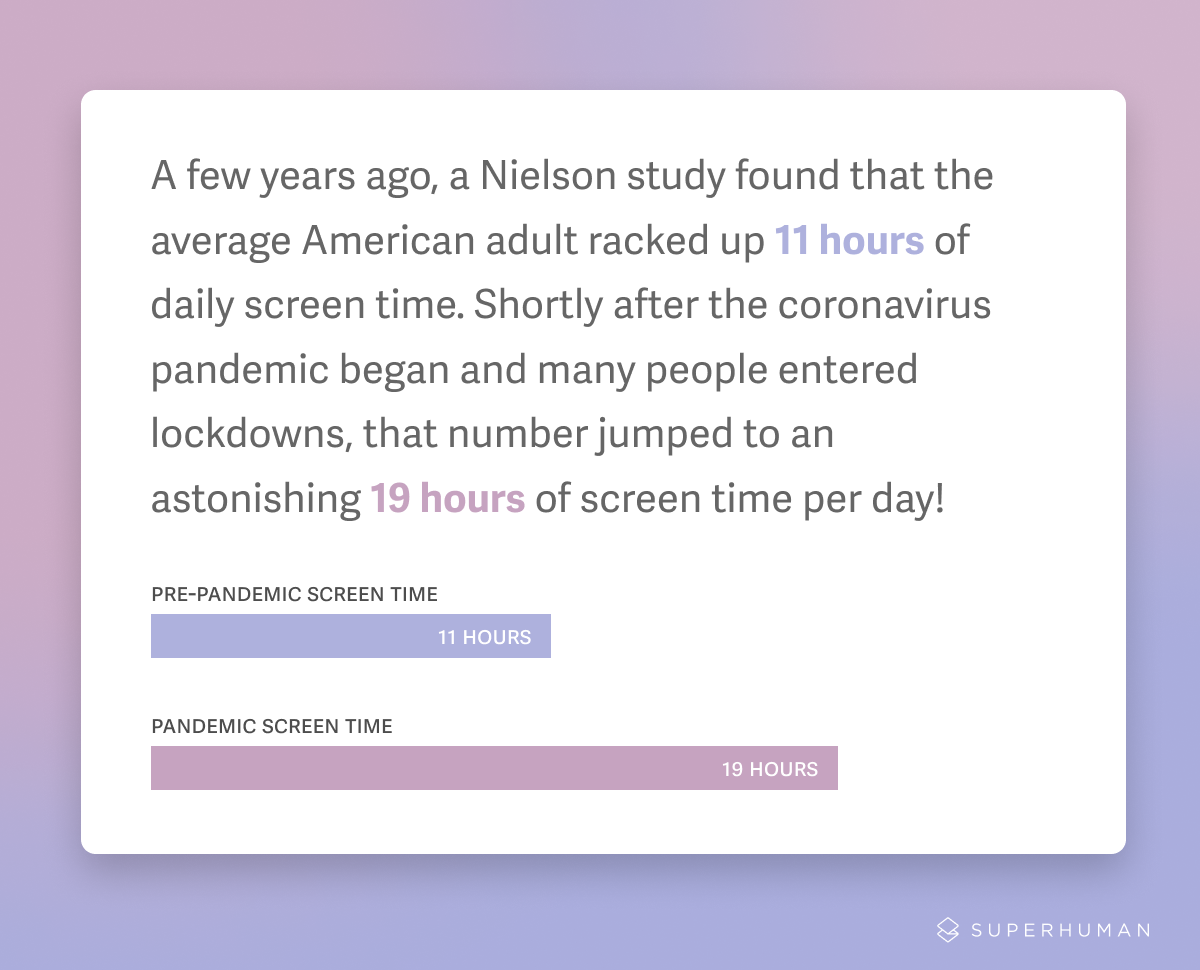
For many of us, excessive screen time is unavoidable because our jobs require us to be in front of screens nearly all the time. Taking that into consideration, experts haven't been able to identify a clear number that shows how much screen time is "enough" or "too much" for adults. But research has suggested possible links between screen time and a number of negative potential health effects.
Potential negative effects of excessive screen time for adults
- Insomnia and poor sleep. This is one area where the science is pretty clear: the blue light created by smartphones and other device screens interferes with your body's natural ability to make melatonin, which helps you fall asleep at night. Playing mobile games or doomscrolling through bad news at bedtime can also keep your brain engaged and awake, making it difficult to get relaxed enough to sleep.
- Addictive behaviors. Social media and smartphones have only existed for around 20 years, which isn't enough time for very clear research into their addictive properties. But there are already some short-term studies that show people can exhibit addictive behaviors related to social media: things like thinking about social media all the time, using it to cope or to modify their moods, and showing symptoms of withdrawal when they are unable to use it.
- Neck, shoulder, and back pain. Spending many hours sitting at a desk in front of a computer, typing on a laptop, or holding a cellphone and looking down at it can place unnecessary strain on your upper body. Over time, that strain can lead to chronic pain in the neck, shoulders, and back.
- Eye strain and headaches. Use of screens for long periods of time, especially if their brightness is all the way up, can strain your eyes. That eye strain can lead to other problems like dry eyes, reduced vision, and headaches.
- Reduced physical activity. Excessive time spent in front of screens means many types of habitual physical activity — going for walks, cleaning the house, gardening, engaging in active hobbies, or exercising — might be reduced. As screen time has increased, experts have noted a decrease in average physical activity, though there are other potential factors at play here, such as jobs that require sitting at a desk for 8 hours each day.
- Changes in cognition. Little is known about how excessive screen time affects the development of adult brains, but a 2020 study showed a link between smartphone addiction and changes to the part of the brain responsible for transmitting messages, which led to lower cognitive performance in people diagnosed with smartphone addiction.
- Reduced mental health. A 2017 study found that US adults who spent more than 6 hours per day watching TV or using computers had a higher risk of depression. More recent studies have found an even stronger link between heavy social media use and mental illness, especially in young people.
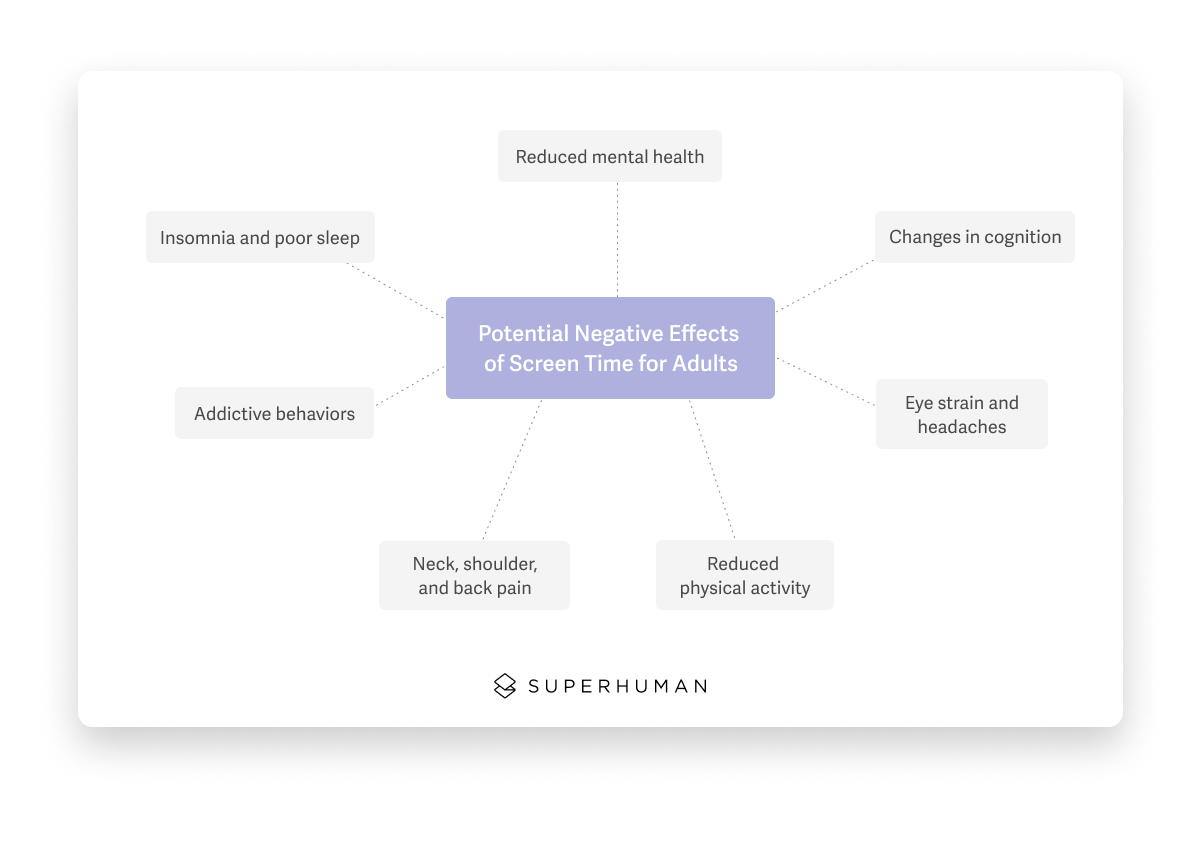
"How much screen time" is the wrong question to ask
Seeing all those possible effects of screen time in a list might be scary! But there's still a lot of uncertainty — and even some controversy — surrounding the research into how screen time affects adults.
Most researchers agree that some of those effects — disrupted sleeping patterns, eye strain, and upper body pain — are undeniably linked to spending a lot of time looking at a computer or smartphone screen (or, in the case of sleep issues, using screens at the wrong time of day). But the links between screen usage and other negative effects, like mental illness, are much more disputed.
That's because there are so many factors other than screen time that could be causing those negative effects. In the example of the link between heavy screen use and depression, it's also unclear if the screen time is a cause of depression, or just one of its symptoms.
"I think it makes perfect sense that people who are depressed could find solace in these [screen-based] activities," Laurence Steinberg, a professor of psychology at Temple University, told TIME magazine in 2019.
So then, we should be asking a different question. Instead of wondering if we're spending too much time in front of screens (when so much of it is outside of our control) we could focus on: "How is this screen time affecting my life and relationships?"
"Content and context matter," Doreen Dodgen-Magee, an Oregon-based psychologist and author of Deviced! Balancing Life and Technology in a Digital World, explained to TIME. Dodgen-Magee told the magazine that the key to healthy screen usage (no matter how much time it takes up) is balancing time in front of screens with time doing other activities. For example, it's important to put down your digital devices when you're spending quality time with friends or family. If you find that you're unable to pay attention to them because you need to check social media while you're spending time together, that's a problem.
This is especially important because of the benefits associated with screen use — screens bring us joy, entertainment, connection with friends and family, the ability to work from home, and so many other potential positives. If you're wondering if you spend too much time in front of screens, you might consider reframing that question to check in with yourself about how you're feeling about your screen time, and let that guide you as you decide how much screen time is right for you.
Cal Newport, an associate professor of computer science at Georgetown University and author of Deep Work, agreed with that assessment.
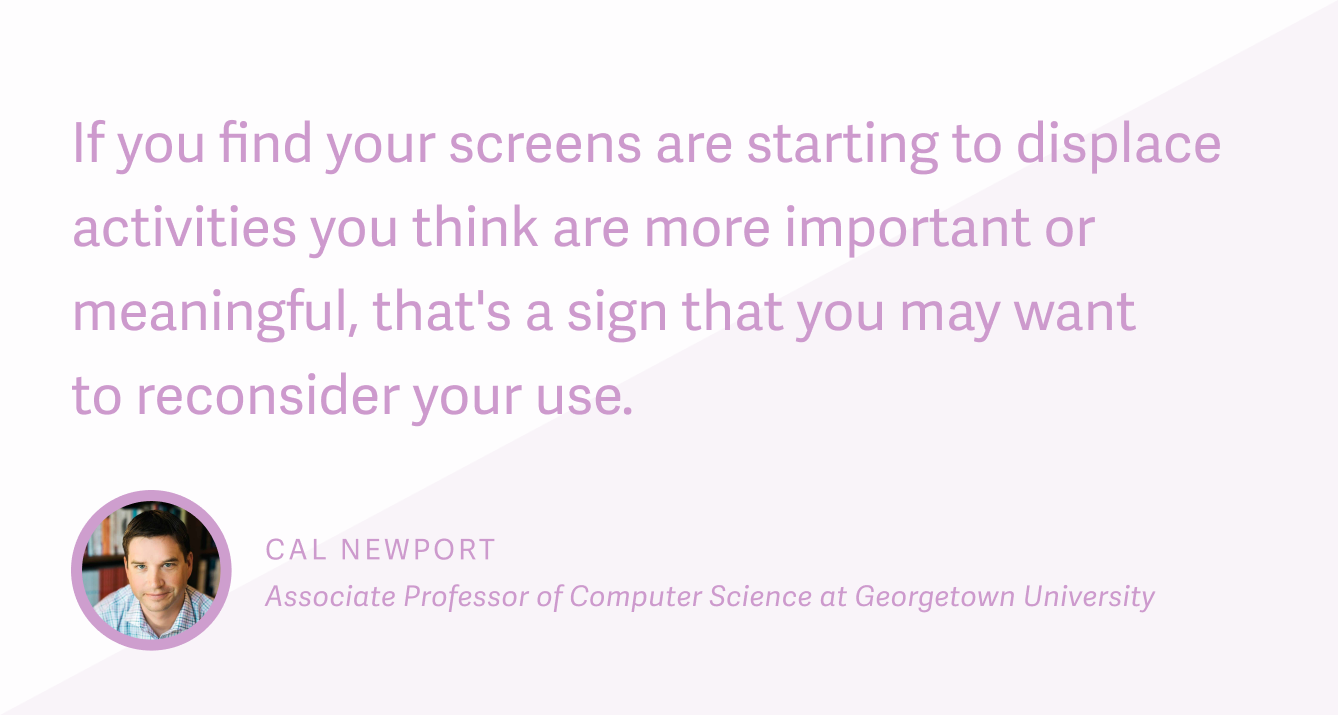
"If you find your screens are starting to displace activities you think are more important or meaningful, that's a sign that you may want to reconsider your use," he said. "If it's your kids' bath time and you're looking at a phone, that's a wakeup call. If you've been looking forward to Game of Thrones all week but then you can't get through the episode without checking your phone, that's a sign you may have shifted toward moderate behavioral addiction."
So the problem may not be how many hours adults spend looking at screens, but rather, the context around when and why — for example, do you lose sleep because you're scrolling on your phone late at night, or miss out on social interactions because you can't stop checking social media or your email?
In those cases, there are benefits to finding ways to adjust your relationship with screens. Here are some tips for creating better screen boundaries for healthier use...
How to develop a healthy relationship with the screens in your life
When you search for advice on how to reduce your screen time, you get a lot of articles that will try to sell you on tips like "leave your phone at home and spend more time outside". For busy people whose jobs require a lot of screen time, a tip like that isn't very practical — or particularly actionable!
So here are some ideas for how you can develop a healthier relationship with the screens in your life. Sometimes that will involve spending less time looking at screens. Other times it will only affect the time, context, or type of screen time you're logging.
Use data to inform your screen time decisions
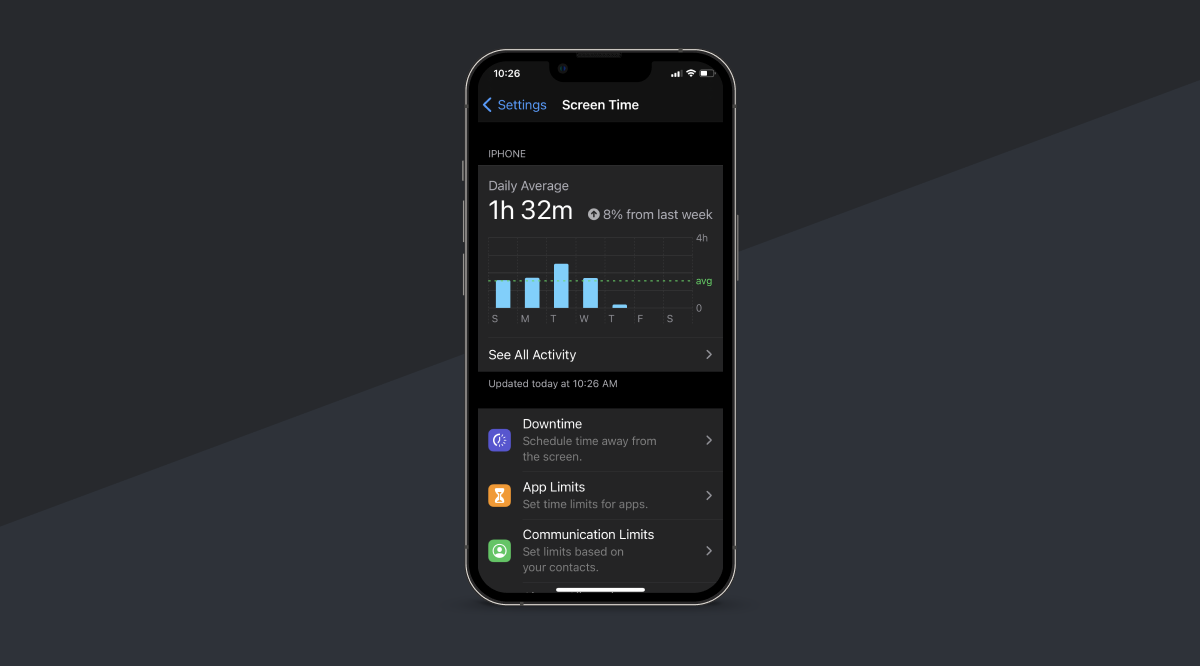
Before you decide what steps you should take to change your screen time habits, collect data to help inform those decisions. Many phones have screen time reporting built in (for example, on iOS go to Settings and click "Screen Time" to see a detailed report), or you can get a habit tracker app that tracks and analyzes your average screen time, and what you spend that time doing (for example, time spent on social media versus checking email, reading the news, or checking Slack).
These reports won't be perfect, since they only work for one device, and most of us spend our screen time across many different devices. But checking screen time reports over a few weeks, or even months, will give you a clearer picture of the amount of time you currently spend in front of screens, and how much of it is productive versus not.
Keep work apps off your personal devices
We all know how tempting it is to respond to a work email or check for Slack messages — even after work hours. But part of creating a healthy relationship with screens has to do with work-life balance. And one failsafe way to create boundaries between your work and your life is to keep access to work apps, like your professional email and Slack accounts, off your personal devices.
Use do-not-disturb features
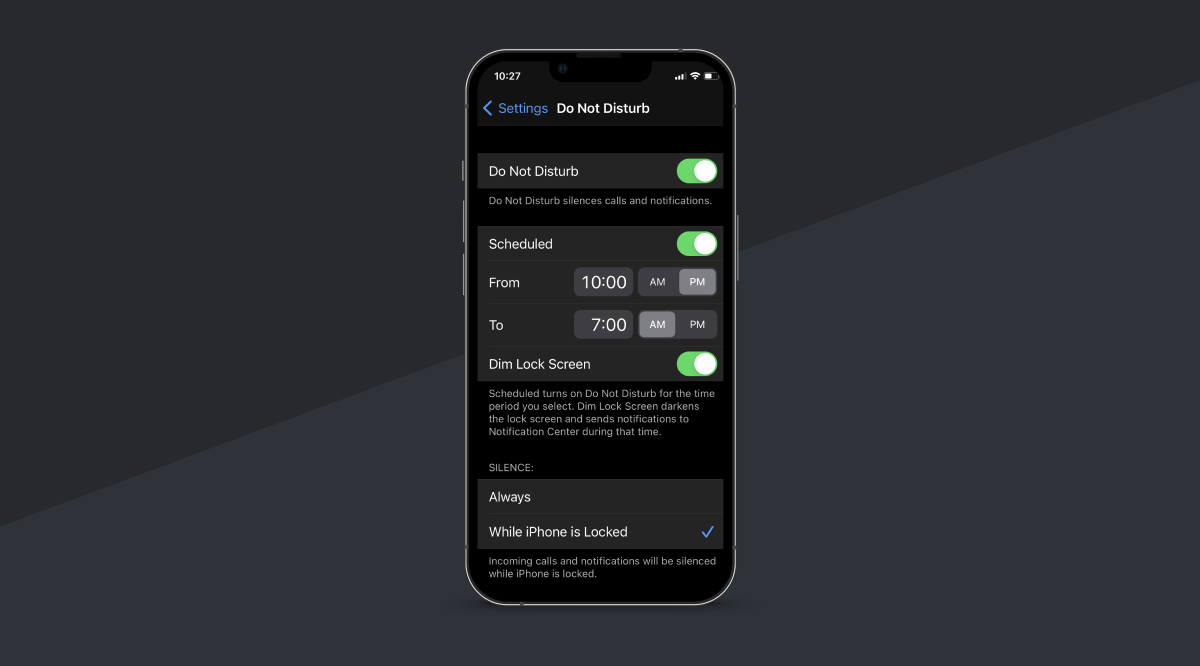
Many phones and other electronic devices have built-in do-not-disturb modes that limit (or eliminate, depending on your settings) notifications once they're toggled on. These can be helpful when you're spending time with friends and family, eating meals, or doing other activities where you'd like to avoid being distracted by or drawn to your screens.
Even when you're not using do-not-disturb mode, it can be helpful to customize your notifications to match your lifestyle — and ensure you aren't being constantly pinged during times when you'd like to be away from screens. You can also take advantage of focus apps to help you concentrate on important tasks and spend screen time more effectively.
Pomodoro your leisure screen time
You've probably already heard of the Pomodoro method, a popular productivity hack that involves spending 20-50 minutes deep working, then taking a short break. You can do the same with your leisure screen time.
For example, if you're playing a mobile video game, set a timer for 20 minutes. When that time is up, pause the game and spend 10 minutes doing another activity — reading (a book or magazine, not digital media), listening to music, taking a walk, or doing a chore are all great options. After a 10-minute break from your screen, you can decide if you want to go back to your game for another 20 minutes — but you might find that you'd rather just continue the screen-free activity you started.
Put your phone away before bed
Yes, this advice is included on every list of tips to reduce screen time. And yes, we included it here because it's really that important. One of the least-disputed negative effects of screen time is how it disrupts our natural sleep patterns, which are essential to good mental health and general wellbeing.
There are many different ways to help mitigate the negative effect screens have on sleep. Creating a good bedtime routine might be the best (if possibly the hardest) way. Your routine should involve some screen-free wind-down time that begins at least 30 minutes (but ideally 1 hour) before you plan to go to sleep.
Another great way to help reduce the effects of screens on your sleep is to use your device's night mode, or install an app like f.lux, which automatically adjusts your displays throughout the day to reduce your exposure to blue light at night. Blue light blocking glasses can also help, especially when used in conjunction with night mode or an app. You can also use wearable technology to help you track sleep habits and quality of sleep.
A final tip: use a real alarm clock instead of setting your morning alarm on your phone. This serves 2 purposes: it allows you to keep your phone away from your bedside (or out of the bedroom entirely) at night, reducing the likelihood that you'll grab it to check messages or scroll when you can't sleep; and it ensures that the first thing you see in the morning isn't a bunch of notifications demanding your attention.
Make screen time more active
As many of our jobs have become more sedentary, innovators have looked for new ways to counteract that. If you want to improve your physical health while on the clock, you can now invest in a treadmill desk or cycle desk so you can work while you literally work out.
But those gadgets are expensive, and there are other, simpler ways to be more active while in front of a screen. Learning some simple stretches or chair yoga poses can help you incorporate more movement into your day. So can setting an alarm to get up and take a lap around the room once per hour.
Another change that can help mitigate the upper body strain that comes with a lot of screen time is improving your posture. Lumo Back is a posture app that includes a wearable device that will help analyze and improve your posture over time.
Use Superhuman to get through email twice as fast

And finally, you can make use of apps that are designed to help you speed through necessary tasks — like Superhuman. We've built the fastest email experience in the world; it helps our customers get through their email twice as fast, saving at least 3 hours per week that they would have otherwise spent in their inbox.
Ready to see how Superhuman can help you reduce the amount of screen time you spend on email? Try Superhuman today.
Get started with Superhuman

